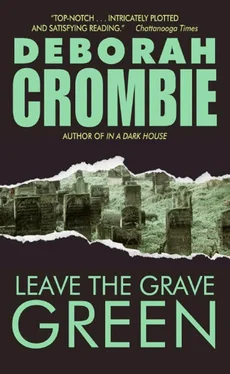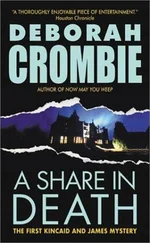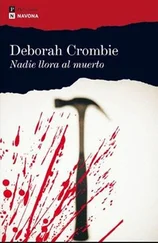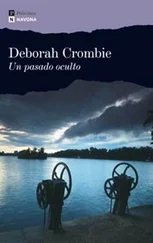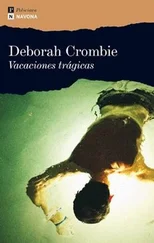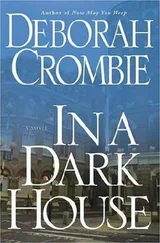Deborah Crombie - Leave The Grave Green
Здесь есть возможность читать онлайн «Deborah Crombie - Leave The Grave Green» весь текст электронной книги совершенно бесплатно (целиком полную версию без сокращений). В некоторых случаях можно слушать аудио, скачать через торрент в формате fb2 и присутствует краткое содержание. Жанр: Детектив, на английском языке. Описание произведения, (предисловие) а так же отзывы посетителей доступны на портале библиотеки ЛибКат.
- Название:Leave The Grave Green
- Автор:
- Жанр:
- Год:неизвестен
- ISBN:нет данных
- Рейтинг книги:5 / 5. Голосов: 1
-
Избранное:Добавить в избранное
- Отзывы:
-
Ваша оценка:
- 100
- 1
- 2
- 3
- 4
- 5
Leave The Grave Green: краткое содержание, описание и аннотация
Предлагаем к чтению аннотацию, описание, краткое содержание или предисловие (зависит от того, что написал сам автор книги «Leave The Grave Green»). Если вы не нашли необходимую информацию о книге — напишите в комментариях, мы постараемся отыскать её.
Leave The Grave Green — читать онлайн бесплатно полную книгу (весь текст) целиком
Ниже представлен текст книги, разбитый по страницам. Система сохранения места последней прочитанной страницы, позволяет с удобством читать онлайн бесплатно книгу «Leave The Grave Green», без необходимости каждый раз заново искать на чём Вы остановились. Поставьте закладку, и сможете в любой момент перейти на страницу, на которой закончили чтение.
Интервал:
Закладка:
Turning back, he waved jauntily to her, then watched the car disappear down Hart Street. The sudden note of concern in her voice struck him as odd. It was she who was driving back to London, while he merely intended an unannounced interview and a recce of Connor Swann’s flat. He shrugged and smiled-he’d quite grown to like her occasional solicitousness.
Henley Police Station lay just across the street, but after a moment’s hesitation he turned and instead climbed the steps to the Town Hall. A cardboard sign taped to the wall informed him that Tourist Information could be found downstairs, and as he descended, he wrinkled his nose at the standard public building accoutrements-cracked lino and the sour smell of urine.
Fifty pence bought him a street map of the town, and he unfolded it as he walked thankfully back out into the sun. He saw that his way lay down Hart Street and along the river, so tucking the map in his jacket and his hands in his pockets, he strolled down the hill. The square tower of the church seemed to float against the softly colored hills beyond the river, and it drew him on like a lodestone. “St. Mary the Virgin,” he said aloud as he reached it, thinking that for an Anglican Church the syllables rolled off the tongue with a very Catholic resonance. He wondered where they meant to bury Connor Swann. Irish Catholic, Irish Protestant? Could it possibly matter? He didn’t yet know enough about him to hazard a guess.
Crossing the busy street, he stood for a moment on the Henley Bridge. The Thames spread peacefully before him, so different from the thunder of water through Hambleden Weir. The river course wound north for a bit after Henley, curved to the east before it reached Hambleden, then meandered northeast before turning south toward Windsor. Could Connor have gone in the river here, in Henley, and drifted downstream to Hambleden Lock? He thought it highly unlikely, but made himself a mental note to check with Thames Valley.
He took a last look at the red-and-white Pimm’s umbrellas beckoning temptingly from the terrace of the Angel pub, but he had other fish to fry.
A few hundred yards beyond the pub he found the address. Next door to the tearoom a discreet sign announced THE GALLERY, THAMESIDE, and a single painting in an ornate gilded frame adorned the shop window. The door chimed electronically as Kincaid pushed it open, then clicked softly behind him, shutting out the hum of sound from the riverside.
The silence settled around him. Even his footsteps were muffled by a thickly padded Berber carpet covering the floor. No one seemed to be about. A door stood open in back of the shop, revealing a small walled garden, and beyond that another door.
Kincaid looked round the room with interest. The paintings, spaced generously around the walls, seemed to be mostly late nineteenth- and early twentieth-century watercolors, and most were river landscapes.
In the room’s center a pedestal held a sleek bronze of a crouching cat. Kincaid ran his hand over the cool metal and thought of Sid. He had made arrangements with his neighbor, Major Keith, to look after the cat when he was away from home. Although the major professed to dislike cats, he looked after Sid with the same gruff tenderness he had shown to the cat’s former owner. Kincaid thought that for the major, as well as himself, the cat formed a living link to the friend they had lost.
Near the garden door stood a desk, its cluttered surface a contrast to the spare neatness he saw everywhere else. Kincaid glanced quickly at the untidy papers, then moved into the second small room which lay a step down from the first.
He caught his breath. The painting on the opposite wall was a long narrow rectangle, perhaps a yard wide and a foot high, and it was lit by a lamp mounted just above it. The girl’s body almost filled the frame. Dressed in shirt and jeans, she lay on her back in a meadow, eyes closed, hat tilted back on her auburn hair, and beside her on the grass a basket of ripe apples spilled over onto an open book.
A simple-enough composition, almost photographic in its clarity and detail, but it possessed a warmth and depth impossible to capture with a camera. You could feel the sun on the girl’s upturned face, feel her contentment and pleasure in the day.
Other paintings by the same artist’s hand were hung nearby, portraits and landscapes filled with the same vivid colors and intense light. As Kincaid looked at them he felt a sense of longing, as if such beauty and perfection existed forever just out of his reach, unless he, like Alice, could step through the frame and into the artist’s world.
He had bent forward to peer at the illegibly scrawled signature when behind him a voice said, “Lovely, aren’t they?”
Startled, Kincaid straightened and turned. The man stood in the back doorway, his body in shadow as the sun lit the garden behind him. As he stepped into the room, Kincaid saw him more clearly-tall, thin and neat-featured, with a shock of graying hair and glasses that gave him an accountantlike air at odds with the casual pullover and trousers he wore.
The door chimed as Kincaid started to speak. A young man came in, his face white against the dead-black of his clothes and dyed hair, a large and battered leather portfolio tucked under his arm. His getup would have been laughable if not for the look of supplication on his face. Kincaid nodded to Trevor Simons, for so he assumed the man who had come in from the garden to be, and said, “Go ahead. I’m in no hurry.”
Rather to Kincaid’s surprise, Simons looked carefully at the drawings. After a few moments he shook his head and tucked them back into the portfolio, but Kincaid heard him give the boy the name of another gallery he might try. “The trouble is,” he said to Kincaid as the door chimed shut, “he can’t paint. It’s a bloody shame. They stopped teaching drawing and painting in the art colleges back in the sixties. Graphic artists-that’s what they all want to be-only no one tells them there aren’t any jobs. So they come out of art college like this wee chappie,” he nodded toward the street, “hawking their wares from gallery to gallery like itinerant peddlers. You saw it-fairly competent airbrushed crap, without a spark of originality. If he’s lucky he’ll find a job frying up chips or driving a delivery van.”
“You were courteous enough,” said Kincaid.
“Well, you have to have some sympathy, haven’t you? It’s not their fault they’re ignorant, both in technique and in the realities of life.” He waved a hand dismissively. “I’ve nattered on long enough. What can I do for you?”
Kincaid gestured toward the watercolors in the second room, “These-”
“Ah, she’s an exception,” Simons said, smiling. “In many ways. Self-taught, for one, which was probably her salvation, and very successful at it, for another. Not with these,” he added quickly, “although I think she will be, but with the work she does on commission. Stays booked two years in advance. It’s very difficult for an artist who is successful commercially to find the time to do really creative work, so this show meant a lot to her.”
Realizing the answer even as he asked and feeling an utter fool, Kincaid said, “The artist-who is she?”
Trevor Simons looked puzzled. “Julia Swann. I thought you knew.”
“But…” Kincaid tried to reconcile the flawless but rather emotionally severe perfection of Julia’s flowers with these vibrantly alive paintings. He could see similarities now in technique and execution, but the outcome was astonishingly different. Making an attempt to collect himself, he said, “Look. I think perhaps I ought to go out and come in again, I’ve made such a muddle of things. My name’s Duncan Kincaid,” he extended his warrant card in its folder, “and I came to talk to you about Julia Swann.”
Читать дальшеИнтервал:
Закладка:
Похожие книги на «Leave The Grave Green»
Представляем Вашему вниманию похожие книги на «Leave The Grave Green» списком для выбора. Мы отобрали схожую по названию и смыслу литературу в надежде предоставить читателям больше вариантов отыскать новые, интересные, ещё непрочитанные произведения.
Обсуждение, отзывы о книге «Leave The Grave Green» и просто собственные мнения читателей. Оставьте ваши комментарии, напишите, что Вы думаете о произведении, его смысле или главных героях. Укажите что конкретно понравилось, а что нет, и почему Вы так считаете.
